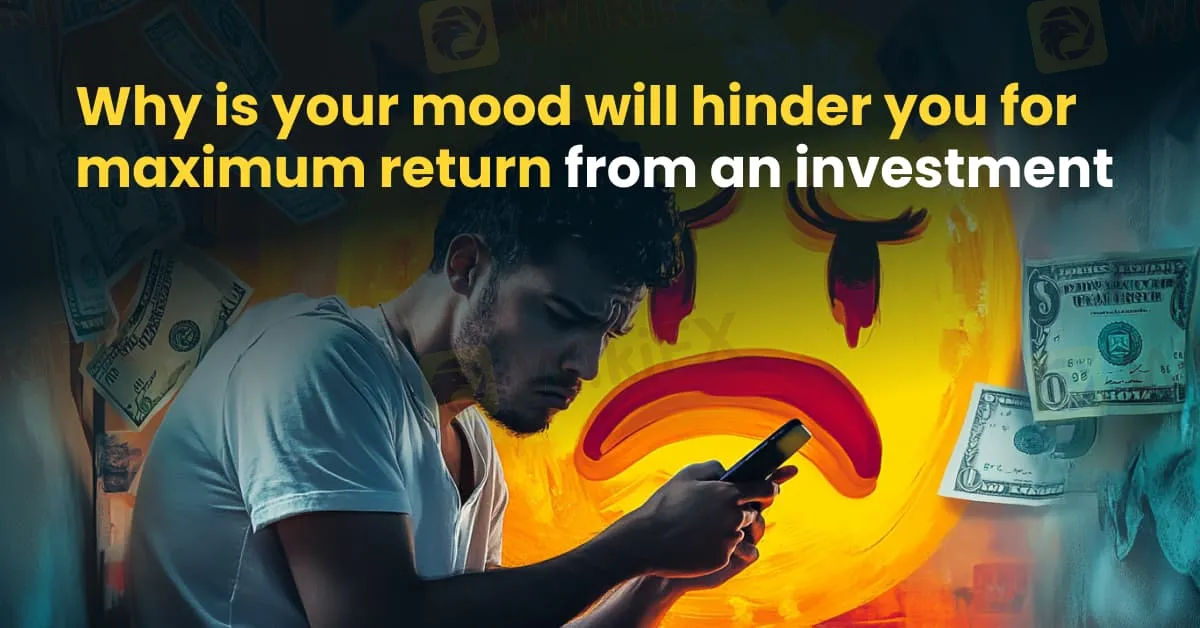简体中文
繁體中文
English
Pусский
日本語
ภาษาไทย
Tiếng Việt
Bahasa Indonesia
Español
हिन्दी
Filippiiniläinen
Français
Deutsch
Português
Türkçe
한국어
العربية
Why does your mood hinder you from getting the maximum return from an investment?
Abstract:Investment decisions are rarely made in a vacuum. Aside from the objective data and market trends, our emotions—and our overall mood—play a crucial role in shaping our financial outcomes. Whether you’re feeling overconfident after a win or anxious after a loss, these emotional states can skew your decision-making process, ultimately affecting your investment returns.

Investment decisions are rarely made in a vacuum. Aside from objective data and market trends, emotions play a crucial role in shaping our financial outcomes. Whether youre feeling overconfident after a win or anxious after a loss, these emotional states can skew your decision-making process, ultimately affecting your investment returns.
The Psychological Underpinnings of Investment Decisions
Investing isnt always a purely rational process. Emotions such as fear, greed, and even sadness can override logic.
- Overconfidence: When youre in a positive mood, you might overestimate your abilities or the potential of your investments, leading to riskier decisions that may not be justified by fundamentals.
- Risk Aversion: A negative mood can trigger excessive caution. You may shy away from taking necessary risks that could yield higher returns.
- Herd Behavior: Your mood can make you more susceptible to following the crowd—buying or selling based on emotional reactions rather than independent analysis.
Mood, Behavioral Biases, and Their Impact on Returns
Emotional Decision-Making
Emotions act as a lens through which we interpret information. For example, if youre feeling optimistic, you might ignore warning signs and invest heavily in a rising asset. Conversely, a pessimistic mood might cause you to exit investments prematurely, locking in losses rather than riding out temporary downturns.
Real-World Implications
Studies in behavioral finance indicate that these mood-induced biases can lead to a portfolio‘s underperformance. For instance, investors who react emotionally to market fluctuations tend to incur higher transaction costs and miss out on gains during market recoveries. By letting mood dictate your decisions, you’re essentially “leaving money on the table.”
Strategies to Mitigate Mood-Driven Decisions
Develop a Robust Investment Plan
Having a clear, written investment plan can serve as a safeguard. By setting predefined entry and exit points, you can reduce the temptation to let your current mood drive your decisions.
Use Automated Tools and Rules-Based Investing
Consider strategies like robo-advisors or systematic investment plans. These tools can help remove emotional bias by executing trades based on predetermined algorithms rather than on impulse.
Regular Self-Assessment
Periodically reviewing your investment decisions and reflecting on whether emotions influenced them can help you recognize patterns. This awareness is the first step toward mitigating bias.
Conclusion
Mood is an ever-present undercurrent in the realm of investing. While it is impossible—and even human—to experience fluctuations in emotion, being aware of how mood affects your decisions is crucial. By implementing disciplined strategies and leveraging automated tools, you can minimize the negative impact of emotional bias. Ultimately, staying focused on long-term fundamentals and maintaining a consistent investment strategy are key to maximizing your returns.

Disclaimer:
The views in this article only represent the author's personal views, and do not constitute investment advice on this platform. This platform does not guarantee the accuracy, completeness and timeliness of the information in the article, and will not be liable for any loss caused by the use of or reliance on the information in the article.
Read more

Voices of the Golden Insight Award Jury | George Georgiou, the Co-Founder of Dynamic Works
WikiFX Golden Insight Award uniting industry forces to build a safe and healthy forex ecosystem, driving industry innovation and sustainable development, launches a new feature series — “Voices of the Golden Insight Awards Jury.” Through in-depth conversations with distinguished judges, this series explores the evolving landscape of the forex industry and the shared mission to promote innovation, ethics, and sustainability.

Prop Firm Tradeify Signs ‘The Nuke’ as Global Brand Ambassador
Miami-based prop trading firm Tradeify has officially announced a major long-term partnership with Luke “The Nuke” Littler, the current World Number 1 and reigning 2024/2025 PDC Darts World Champion. Littler joins Tradeify as its new Global Brand Ambassador, marking one of the company’s most significant branding investments to date.

Close Up With WikiFX —— Take A Close Look At Amillex
With the rapid growth of global multi-asset investment markets, the differences among regional forex markets have become increasingly significant. As a forex broker information service platform operating in more than 180 countries and regions, WikiFX is dedicated to helping investors in every market identify reliable brokers. Therefore, we have launched an exclusive interview series —— "Close Up With WikiFX", offering in-depth conversations with local brokers. This series aims to dive deep into frontline markets and provide first-hand information, helping investors gain a clearer and more comprehensive understanding of quality brokers.

Cloudflare Outage Disrupts Broker Websites and Crypto Platforms
Cloudflare outage causes widespread disruption to broker websites and crypto platforms, highlighting risks in web infrastructure reliance.
WikiFX Broker
Latest News
GGCC Bonus and Promotions: A Data-Driven Analysis for Experienced Traders
Close Up With WikiFX —— Take A Close Look At Amillex
CapEx Spending On AI Is Masking Economic Weakness
Questrade Review Pros, Cons and Regulation
AccentForex Review: Is It Safe to Invest or Scam?
Prop Firm Tradeify Signs ‘The Nuke’ as Global Brand Ambassador
In-Depth Review of INZO Deposits, Withdrawals, and Fund Handling
Voices of the Golden Insight Award Jury | George Georgiou, the Co-Founder of Dynamic Works
Is Your Money Safe? The Capital.com Withdrawal Mystery Revealed
Is the AI Boom About to Break? Are We Entering the Next Tech Bubble?
Currency Calculator



